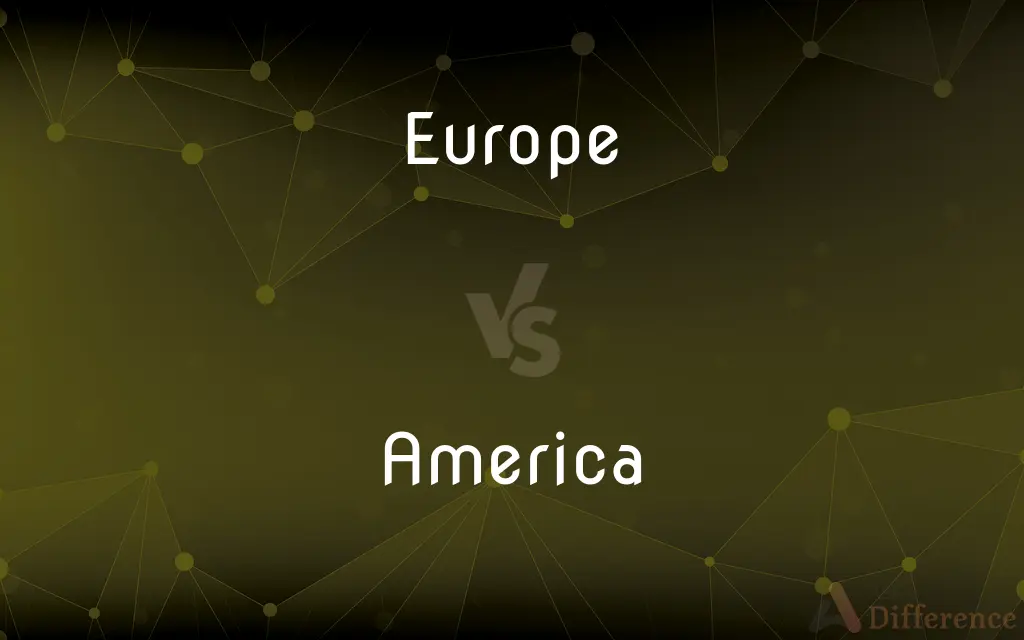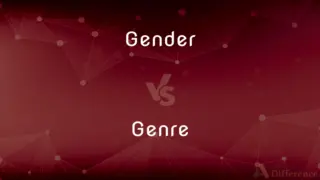Europe vs. America — What's the Difference?
By Tayyaba Rehman — Updated on September 22, 2023
Europe is a continent primarily in the Northern Hemisphere, while America refers to the landmass comprising North and South America in the Western Hemisphere.

Difference Between Europe and America
Table of Contents
ADVERTISEMENT
Key Differences
Europe and America, both vast regions, have distinct geographical, cultural, and historical identities. Europe is a continent comprising countries such as France, Germany, and Italy, known for their rich history, varied cultures, and influential roles in global affairs. America, on the other hand, encompasses two continents: North America, with countries like the USA and Canada, and South America, with nations like Brazil and Argentina.
While Europe boasts ancient civilizations, medieval kingdoms, and modern global powers, America's history is marked by indigenous cultures, European colonization, and the rise of influential nations in global politics and economics. Europe's diverse languages, from Spanish to Russian, reflect its mosaic of nations. Conversely, America, although diverse, has a more significant Spanish and English linguistic influence due to colonization.
Europe's landscapes, from the Mediterranean's sunny shores to the Nordic's chilly fjords, contrast with America's vast plains, towering mountain ranges, and extensive coastlines. European cities, with their historic centers and iconic landmarks, often stand in contrast to America's bustling metropolises, marked by skyscrapers and modern architecture.
While both Europe and America play pivotal roles in global politics, economics, and culture, they are distinguished by their unique histories, cultures, and geographies.
Comparison Chart
Geographical Location
Primarily in the Northern Hemisphere
Western Hemisphere comprising North and South America
ADVERTISEMENT
Size
Smaller in land area compared to America
Larger, spanning two continents
Historical Background
Ancient civilizations, medieval kingdoms
Indigenous cultures, European colonization
Notable Languages
Spanish, English, French, German, Russian, etc.
Primarily English and Spanish, with many indigenous languages
Typical Landscapes
Varied, from sunny Mediterranean to Nordic fjords
Vast plains, mountains, Amazon rainforest, etc.
Compare with Definitions
Europe
A continent in the Northern Hemisphere.
She visited several countries in Europe during her vacation.
America
Refers to both North and South America.
Christopher Columbus is often credited with discovering America.
Europe
Known for its historical significance and ancient civilizations.
Ancient Greece in Europe is considered the cradle of Western civilization.
America
Encompasses countries like the USA, Canada, Brazil, and Argentina.
The cultures in America range from Canadian to Argentinean.
Europe
A region with diverse landscapes and climates.
The Alps in Europe are a popular destination for skiing.
America
Known for its varied geography and natural landmarks.
The Grand Canyon in America is a popular tourist attraction.
Europe
Home to nations like France, Germany, and Italy.
Europe has a rich tapestry of cultures and languages.
America
Home to a mix of indigenous and colonial cultures.
America's history is a blend of native traditions and European influences.
Europe
Plays a pivotal role in global politics and economics.
Many global institutions have their headquarters in Europe.
America
A major player in global politics and economy.
Several of the world's largest economies are located in America.
Europe
Europe is a continent located entirely in the Northern Hemisphere and mostly in the Eastern Hemisphere. It comprises the westernmost peninsulas of the continental landmass of Eurasia, and is bordered by the Arctic Ocean to the north, the Atlantic Ocean to the west, the Mediterranean Sea to the south, and Asia to the east.
America
48 conterminous states in North America plus Alaska in northwest North America and the Hawaiian Islands in the Pacific Ocean; achieved independence in 1776
Europe
The 2nd smallest continent (actually a vast peninsula of Eurasia); the British use `Europe' to refer to all of the continent except the British Isles
America
North and South America
Europe
An international organization of European countries formed after World War II to reduce trade barriers and increase cooperation among its members;
He took Britain into Europe
Europe
The nations of the European continent collectively;
The Marshall Plan helped Europe recover from World War II
Common Curiosities
Which continents constitute America?
America comprises North America and South America.
Does America refer only to the USA?
No, America refers to both North and South America, but in casual speech, it often means the USA.
How do the histories of Europe and America differ?
Europe has ancient civilizations and medieval histories, while America's history is marked by indigenous cultures and European colonization.
What are the primary languages spoken in Europe?
There are many, including English, Spanish, French, German, Russian, and more.
Is the UK part of Europe?
Geographically, yes; politically, it has left the European Union.
Which countries are part of Europe?
Europe includes countries like France, Italy, Germany, Spain, and many more.
What's the main language in America?
English is predominant in North America, but Spanish is widespread, especially in South America.
Is Europe a country or a continent?
Europe is a continent.
Are the terms "America" and "Americas" interchangeable?
Not exactly. "America" can refer to the whole or just the USA, while "Americas" clearly denotes North and South America together.
Which region, Europe or America, is larger in land area?
America, comprising two continents, is larger in land area than Europe.
Share Your Discovery

Previous Comparison
Gender vs. Genre
Next Comparison
Copywritten vs. CopyrightedAuthor Spotlight
Written by
Tayyaba RehmanTayyaba Rehman is a distinguished writer, currently serving as a primary contributor to askdifference.com. As a researcher in semantics and etymology, Tayyaba's passion for the complexity of languages and their distinctions has found a perfect home on the platform. Tayyaba delves into the intricacies of language, distinguishing between commonly confused words and phrases, thereby providing clarity for readers worldwide.
















































